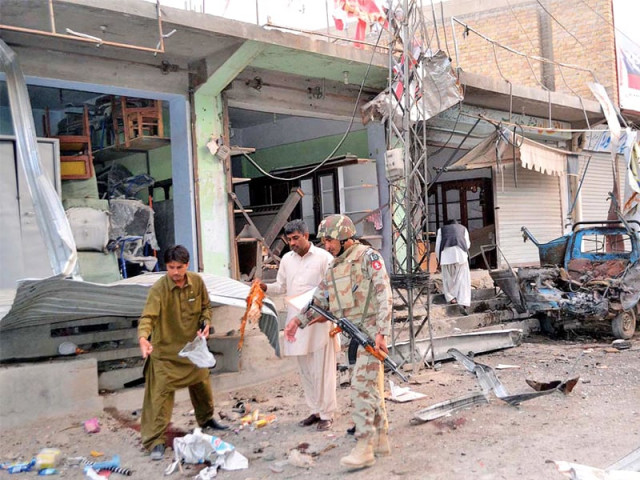Quetta unrest: Fazlur Rehman survives suicide blast
Provincial authorities ban political gatherings in Balochistan; IED attack on FC convoy kills three soldiers

Separate bombings ripped through the heart of Balochistan’s capital on Thursday, targeting first a convoy of paramilitary soldiers and then a rally staged by the influential but out-of-power Jamiat Ulema-e-Islam-Fazl (JUI-F) leader Maulana Fazlur Rehman.
Maulana Fazl survived the suicide attack but an activist of his party was killed and 22 others wounded. The bombing took place less than 400 metres from where the party was holding a huge political gathering. This is the third attempt on Maulana Fazl’s life since 2011.
Following the attack, authorities in the strife-hit province advised Maulana Fazl to leave the province for his safety. But Maulana Fazl has refused to heed the government’s advice, Home Minister Mir Sarfraz Bugti told The Express Tribune.
As a consequence, he said, the Balochistan government has imposed an immediate ban on political gatherings in the province.
Three people were killed and 17 others, mostly civilians, were wounded earlier in the day by an improvised explosive device (IED) targeting a Frontier Corps (FC) convoy.
Although unhurt, Fazl appeared visibly shaken following the incident. “My car was damaged, but we remained unhurt since it was bulletproof,” he told reporters after the blast. The JUI-F chief claimed he was the attacker’s intended target, although he said he never received any threat or warning from any group.
His statement was backed by Senior Superintendent (SSP) Operations Aitzaz Guraya. “The suicide bomber tried to attack Maulana Fazl’s vehicle just as the latter was going back after his speech,” he said.
However, according to Capital City Police Officer (CCPO) Abdul Razzaq Cheema, the suicide attacker planned on attacking the main JUI-F rally.
Balochistan Home Minister Sarfraz Bugti gave a similar statement as well, saying, “The suicide bomber wanted to make his way inside the football ground, but could not succeed because of foolproof security arrangements and the deployment of police, anti-terrorism force and security personnel.”
Over 15,000 JUI-F workers and supporters were gathered at the rally, held inside Quetta’s Sadiq Shaheed Football Ground.
According to several news channels, the proscribed Jundullah outfit claimed responsibility for the attack.
Talking about why he could have been targeted, Fazl said, “I speak against the US and I speak up for the enforcement of Islamic law… maybe that is why I was attacked.” He added that it was the responsibility of law enforcement agencies to probe the incident.
Meanwhile, CCPO Cheema said the bodies of both the deceased JUI-F activist and the suicide attacker were brought to the Provincial Sandeman Hospital. Authorities at the hospital confirmed the number of casualties. “We received two bodies and 22 people with injuries from the blast,” a medic at the hospital said. He added that some of the wounded had to be moved to the Comined Military Hospital in Quetta due to their critical condition.
A state of emergency was imposed at the Sandeman Hospital after the attack outside the JUI-F rally as medics were already busy treating victims of the earlier IED blast, which took place in Quetta’s Qambrani Road locality.
According to police officials, the IED, which was mounted on a motorcycle, was remotely detonated as soon as an FC convoy passed by it. Three civilians were killed and 15 others were wounded in the incident, they said. Two FC soldiers also received minor injuries. Most of the victims were sitting at a roadside teashop and hotel, the officials added.
Following the blast, residents of Qambrani Road staged a protest against the government and law enforcement and security agencies, and said they had failed to protect the lives of ordinary citizens.
‘Jundollah has no links to Iranian outfit’
Jundollah, the militant group that claimed responsibility for Thursday’s bombing, has no links with the Iranian-based Jandallah organisation, according to Mir Sarfraz Bugti.
‘Jundallah is a Peshawar-based militant outfit which accepted responsibility for the September 2013 church bombing in Peshawar that killed 18 people and injured another 250,” Bugti told The Express Tribune. Jundallah (Pakistan) is associated with the Tehreek-e-Taliban Pakistan (TTP).
The group is believed responsible for a string of terrorist attacks in Karachi including the June 2004 assassination attempt on Gen Ahsan Saleem Hayat, a one-time corps commander of Sindh. It also carried out the Nanga Parbat attacks which left at least 10 foreign tourists dead.
Maulana Fazl was cited by the home minister as saying that he had no inkling about Jundollah as a group and could not fathom its motives. “The JUI-F chief himself is not clear about the motive behind an attempt on his life,” Bugti said.
Jan Achakzai, a spokesman for Maulana Fazlur Rehman, said that he has no knowledge about the militant organisation Jundollah. “We have no mechanism to ascertain the credibility of the claim.”
Published in The Express Tribune, October 24th, 2014.



















COMMENTS
Comments are moderated and generally will be posted if they are on-topic and not abusive.
For more information, please see our Comments FAQ